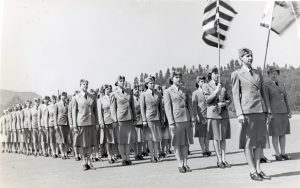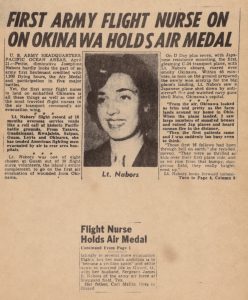Meet the former US Army flight nurses whom I interviewed for
Beyond the Call of Duty: Army Flight Nursing in World War II.
In 1986 as part of my research about flight nurse history and coping with war, I was privileged to interview 25 former US Army nurses about events of their flight nurse duty in World War II. Most of them are now deceased, but their stories live on in Beyond the Call of Duty: Army Flight Nursing in World War II.
The journal I kept of my time with each of them in 1986 when writing my dissertation offers a brief personal glimpse of these remarkable women. I am sharing edited versions of these journals, in the order in which the interviews took place. The actual interviews are in separate documents.
23rd Interview
Adele Edmonds Daly
801 MAES Pacific
20 June 1986
I met with Adele Daly in her home in Palo Alto, California. I found myself less enthusiastic about this interview than I had been about other interviews. One reason, I know, is that Adele had some difficulty hearing and understanding me in phone calls to coordinate my visit. I thought that perhaps she had a hearing loss that would make an interview difficult. But in spite of my concern I decided to go ahead with the interview, since Adele sounded so enthusiastic about my study.
My flights were more tiring than usual from the physical exertion of carrying my bags across flight lines to planes and one leg of the trip with every seat filled, delays, and demanding passengers. That didn’t help my mood once I arrived in San Jose, nor did the traffic.
The trip to Palo Alto via rental car took only minutes; I had expected a much longer drive. When I arrived in Palo Alto, I called Adele, who had no trouble understanding me this time, and she encouraged me to come to her house right away, even though I had arrived much earlier than expected.
Adele was a very pleasant, warm, hospitable person whom I liked immediately and with whom I felt comfortable. I hadn’t yet eaten, and Adele fixed me a light lunch that I ate as we chatted casually and got to know each other better. I realized how wrong I had been to prejudge her unfavorably, and I was glad I hadn’t let my unfavorable impression keep me from making the trip.
Adele was not especially talkative, but she did talk easily as she shared experiences. She lacked some of the spontaneity of other women I’ve interviewed, but what experiences Adele did share, she covered in enough detail to give a good picture of her feelings and relevant actions.
About flight nurse training, for example, Adele said, that what the flight nurses learned at Bowman Field during their course had helped them to a certain extent, “but we never realized that we’d have so little to do with.” Her nurses training had taught her to improvise, an important skill for making do with less during the war.
Nor had Bowman Field prepared her for the reptiles and bugs overseas. Flight nurses often remained overnight in Bougainville when out on air evacuation flights, Adele remembered with an “oooh!” and much laughter, because of the lizards and snakes and so many crawly things. “I don’t know how you can prepare yourself for something like that,” she said, “because I’d always been terrified of them.”
Like other woman I‘ve interviewed, Adele is a gracious individual with the special ability to make a person feel welcome and at home. It was a pleasant visit and a good interview.
One of Adele’s stories: Adele laughs about it now, but she remembers flight nurse training as “Very rugged. Very rugged! You knew that everything you participated in would make or break you.” The discipline and routine were quite different from what she had experienced before, even in her nurses training. “And bivouacking and marching and constantly being on the run to go to class or to do something. Your day was just terrifically full. You’d be exhausted at night.” She particularly recalled when the nurses had to maneuver the obstacle course under small arms fire. The flight nurses used to talk about those things and wonder how they could ever survive the actual war, “which we knew we were eventually going to be in when we finished.”
Adele died in 2005.



